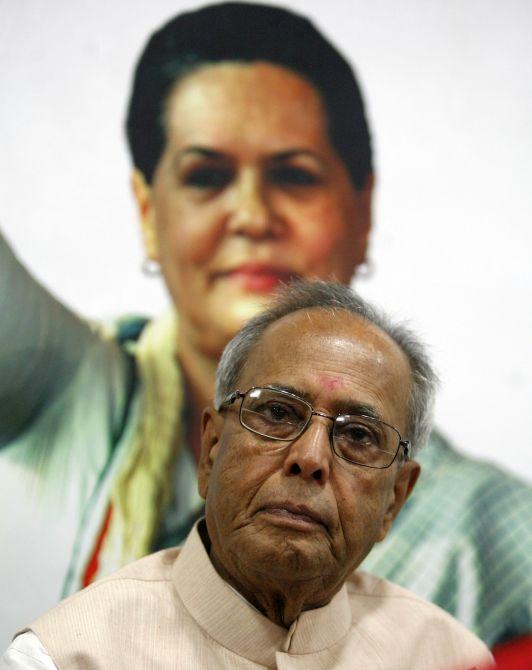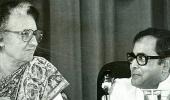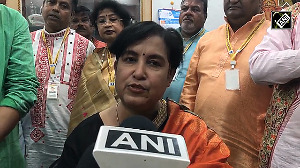The President may not have agreed with the government on many occasions.
Not once was this ever made public though he told off ministers in private, reports Aditi Phadnis.

Photograph: Amit Dave/Reuters
It was hot, that evening of May 22, 2004, a day before the United Progressive Alliance was to be sworn in. This was the first major tryst of the Congress with coalition politics at Delhi.
As television channels were going wild speculating about who was going to get what portfolio, Pranab Mukherjee was sitting quietly in his small study in his Talkatora Road residence, going through various reports on the functioning of the Union home ministry; a few party seniors had confidently told him that he would be India's Union home minister in a few hours.
Kashmir had seen a terror attack and some news channels -- confident that they were interviewing the next home minister -- even aired some comments from Mukherjee on the attack.
Late in the evening, as those channels flashed the portfolios of the new ministers in Manmohan Singh's council, against Mukherjee's name the legend said: Defence minister.
There was an air of disbelief on Talkatora Road. His close aides, under the mistaken impression that the defence ministry was a portfolio a notch lower than the home ministry, were both shocked and indignant.
But what did the man himself do? He took 10 to 15 seconds to digest the new situation. Went to the toilet. Came back and ordered his assistant: 'Connect me to the defence secretary.'
Pranab Mukherjee, then the most experienced minister in the UPA, knew that slippery patches abound in the corridors of power -- and you must take what you get, there is no time to ponder over unfulfilled possibilities.
But when he left the ministry to occupy another corner of the South Block as foreign minister in 2007, he had begun to like being defence minister.
"I enjoyed it a lot. So much to learn, so many technical things, and more than anything, it was a new kind of a job," said the minister who has handled finance, planning commission, commerce, shipping and transport, industrial development, steel and mines in the past and caps it all by becoming President of India.
His affection for Indira Gandhi has stayed with him. And he learnt a lot from her administrative skills and tactics in party politics.
He also earned her anger when he contested and lost the Lok Sabha elections in 1980 (this prominent Gandhi family loyalist could not win a Lok Sabha election until 2004).
Indira Gandhi telephoned Mukherjee a few hours after the results were out: 'Everyone in this country knew that you would not win. Even your wife Shuvra knew it. What made you think that you could pull through?' and without waiting for an answer slammed the phone down.
After two days, Mukherjee got another call from Delhi. This time it was Sanjay Gandhi: 'Mummy is very angry with you. But she also said that there cannot be a Cabinet that doesn't have Pranab.'
Pranab Mukherjee became the Union finance minister in Indira Gandhi's council of ministers and was accommodated through a Rajya Sabha seat.
His first Budget speech in 1982 lasted for 1 hour and 35 minutes. "I'll never forget what Indira Gandhi said in the House after I finished. She remarked: 'The shortest finance minister has delivered the longest Budget speech'."
Balram Jakhar, sitting in the Speaker's chair, quipped: 'It's a long and short story,' he once told a reporter.
His fall from grace after Indira Gandhi's assassination is too well known to bear repetition. But, rehabilitation followed.
Then prime minister P V Narasimha Rao was also advised once to shunt Pranab Mukherjee out. A group of jealous senior leaders gave a long deposition to Rao that he should immediately make Mukherjee the governor in Uttar Pradesh which would more or less have ended the Bengali leader's political career. Rao heard them with patience.
Then he gave his s verdict: 'Already most of our voters have fled to Mulayam Singh Yadav. If Pranab becomes governor, hearing his Hindi accent, the rest will also run away.'
By the end of the UPA's tenure, it was clear that Mukherjee had his sights set on Raisina Hill.
He was not to be denied. The chatter about his Presidency is the mercy petitions for death sentences that he turned down. But that was classical Mukherjee -- a man who believes you must be responsible for your actions.
He has not stinted in reminding the government and the Opposition alike about their responsibilities -- in several speeches he has recorded how disappointed he was in the Opposition stalling Parliament.
In others, he has quoted Hindu scriptures to illustrate that inclusiveness has always been a part of Indian society.
The steps taken by Mukherjee to revive and restore Rashtrapati Bhavan's priceless architecture and artefacts was part of a project to maintain the continuum in history.
Rashtrapati Bhavan also opened its doors to scholars, musicians and scientists who were invited to treat it as a retreat.
Mukherjee's respect for the Constitution is unparalleled.
He might not have agreed with the government on many occasions. Not once was this ever made public -- though he told off ministers in private.
It is a tribute to him that he did; and a tribute to them that they took it.












 © 2025
© 2025